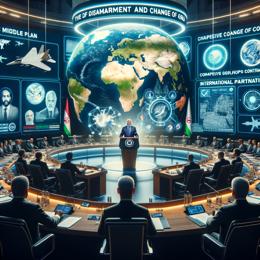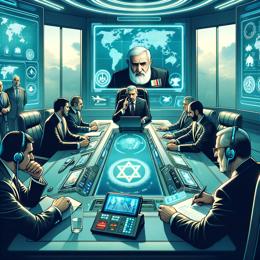Image created by AI
Russia to 'Deter' NATO Expansion as Tensions Over Ukraine Escalate
In a significant development that has escalated tensions in the fragile geopolitical landscape of Eastern Europe, Kremlin spokesman Dmitry Peskov announced Russia's intention to "counteract" NATO's increasing activities near its territory. The response from Moscow comes on the back of a series of military strategic advancements by NATO, which Russia perceaks as encroaching and a substantial threat to its national security.
This week's revelations from a NATO summit in Washington, DC, unveiled plans to establish logistical centers close to the Black Sea and to bring additional military facilities to Europe. According to Mr. Peskov, these activities necessitate Russia to adopt "thoughtful, coordinated, effective responses" to both deter and counteract NATO's burgeoning infrastructure.
In a move that has particularly stirred Russian apprehension, the United States and Germany declared their intention to place American long-range missiles including the sophisticated surface-to-air SM-6, the formidable Tomahawk cruise missiles, and hypersonic weapons on German soil starting 2026. The announcement was a hallmark outcome of the NATO summit and signals a robust enhancement of defense capabilities against potential threats.
Moreover, a new missile shield now operational in northern Poland has been introduced by NATO. The installation aims to bolster the alliance's early detection and interception capabilities against ballistic missile attacks. Unfortunately, this action synonymous with reinforcing security from one viewpoint is interpreted as an act of aggression from another, contributing to a continuing spiral of mistractic and saber-rattling.
The build-up has not gone unnoticed by Russian leadership, with President Vladimir Putin expressing concerns previously and now mooting a potential counter-measure in the form of resumption in the production and deployment of Russia's intermediate-range nuclear-capable missiles. This stark position harks back to the Cold War era, a time when such military stand-offs were alarmingly common.
The discourse has not solely been confined to land-based missile deployments. The cascading effects of the United States withdrawing from the Intermediate-Range Nuclear Forces (INF) Treaty in 2019, an agreement that was instrumental in curbing the proliferation of nuclear missiles within a particular range, have contributed to the heightened stance Russia finds itself in.
On the battleground, recent developments at the frontline in Eastern Ukraine further exemplify the intense confrontation. Russia's capture of Voskhod village near Donetsk and Ukraine's call for additional weaponry to bolster its defensive efforts against Russia denote a continuing trend of territorial conflict and international anxiety over the prospect of widescale warfare.
With Turkish President Recep Tayyip Erdogan intimating his concerns over the worrying possibility of a direct confrontation between Russia and NATO, the call to consciously avoid escalation is an urgent reminder of the fragile balance that keeps global peace intact.
As situations evolve rapidly on this geopolitical chessboard, a careful and strategic consideration of each move made by the players involved is ever more critical to avoid tipping the scales towards a confrontation nobody can afford.










